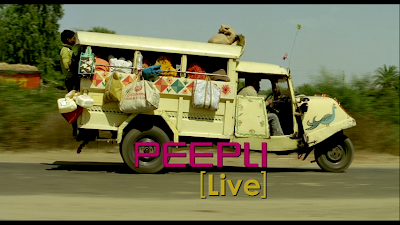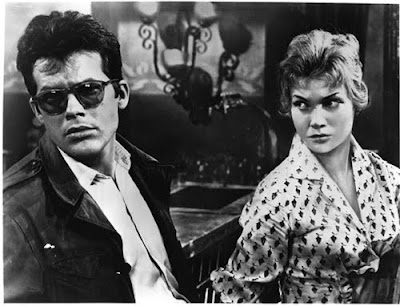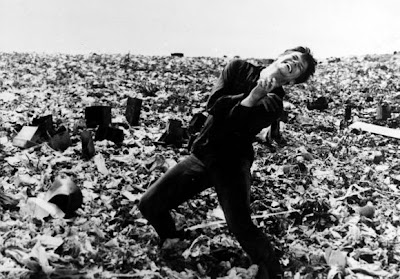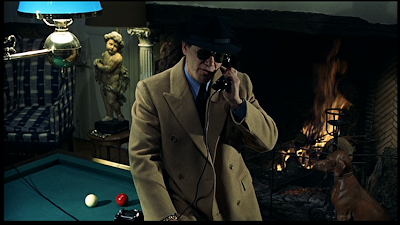 Peepli Live
Peepli LiveA film by Anusha Rizvi
Mehmood Farooqi : Co director
Year:2010
Runtime :
With English subtitles
3rd July 2011 ; 5.45pm
Perks Mini Theater
 A television crew intrudes into a village hutment and plonks a camera bang in the middle of its cramped, messy space. It is looking for an exclusive, TRP-boosting ‘conversation’ with a suicidal farmer. The latter, dread and bewilderment writ large on his face, cringes in a corner of the room. The star reporter, doing her best to exude sympathy, seeks to assuage the man's fears. "Don’t be afraid," she says. "This camera cannot do anything."
A television crew intrudes into a village hutment and plonks a camera bang in the middle of its cramped, messy space. It is looking for an exclusive, TRP-boosting ‘conversation’ with a suicidal farmer. The latter, dread and bewilderment writ large on his face, cringes in a corner of the room. The star reporter, doing her best to exude sympathy, seeks to assuage the man's fears. "Don’t be afraid," she says. "This camera cannot do anything." Well, the TV cameras do an awful lot of things in Peepli Live, and not all of it is of a salutary nature. Writer-director Anusha Rizvi's debut feature, a disarmingly simple but remarkably powerful film, is a major triumph. She taps into the power of the medium to narrate a story rooted firmly in the depressing realities of rural India, but without ever going into paroxysms of self-righteous indignation.
Well, the TV cameras do an awful lot of things in Peepli Live, and not all of it is of a salutary nature. Writer-director Anusha Rizvi's debut feature, a disarmingly simple but remarkably powerful film, is a major triumph. She taps into the power of the medium to narrate a story rooted firmly in the depressing realities of rural India, but without ever going into paroxysms of self-righteous indignation. Peepli Live lampoons an entire range of usual suspects – voyeuristic media persons, smarmy bureaucrats, scheming local-level political goons and self-serving rulers, all of whom want a piece of the sleepy village where a farmer is about to kill himself so that his family can survive. Thanks to the film's nifty blend of humour and bathos, it does not slip into diatribe mode. It instead acquires the spiky edge of a pulsating yet biting satire.
Peepli Live lampoons an entire range of usual suspects – voyeuristic media persons, smarmy bureaucrats, scheming local-level political goons and self-serving rulers, all of whom want a piece of the sleepy village where a farmer is about to kill himself so that his family can survive. Thanks to the film's nifty blend of humour and bathos, it does not slip into diatribe mode. It instead acquires the spiky edge of a pulsating yet biting satire. Rizvi collates elements from the theatre of the absurd to craft her sly portrait of a grim scenario that urban Indian moviegoers are rarely, if ever, exposed to. The film explores the clinical and incongruous response of the media and the ruling establishment to what is a life and death question for a farmer on the brink of becoming just another statistic in a never-ending tale of woes. This coldness is best captured in the nonchalant refrain of the natty agriculture secretary: "we must wait for the court's order."
Rizvi collates elements from the theatre of the absurd to craft her sly portrait of a grim scenario that urban Indian moviegoers are rarely, if ever, exposed to. The film explores the clinical and incongruous response of the media and the ruling establishment to what is a life and death question for a farmer on the brink of becoming just another statistic in a never-ending tale of woes. This coldness is best captured in the nonchalant refrain of the natty agriculture secretary: "we must wait for the court's order." The peasant-protagonist Natha (amateur actor Omkar Das) cannot wait. He and his elder brother, Budhia (Raghuvir Yadav), are in danger of losing their plot of land, having failed to repay a bank loan. By way of one last desperate throw of the dice, Natha decides to commit suicide in the hope of securing a government compensation of Rs 100,000 for his dependents. But as word gets around, the media descends on the village for a scoop and opportunistic politicians jump into the fray to draw mileage from Natha's predicament.
The peasant-protagonist Natha (amateur actor Omkar Das) cannot wait. He and his elder brother, Budhia (Raghuvir Yadav), are in danger of losing their plot of land, having failed to repay a bank loan. By way of one last desperate throw of the dice, Natha decides to commit suicide in the hope of securing a government compensation of Rs 100,000 for his dependents. But as word gets around, the media descends on the village for a scoop and opportunistic politicians jump into the fray to draw mileage from Natha's predicament. As the frenzy peaks, cold drink kiosks and tea stalls come up around Natha's house in next to no time. The whole world wants to know whether Natha will really die. But does anybody really care?
As the frenzy peaks, cold drink kiosks and tea stalls come up around Natha's house in next to no time. The whole world wants to know whether Natha will really die. But does anybody really care? We laugh as everybody in Peepli seems to cut a sorry figure. But do we feel guilty as well? Peepli Live seeks to push us across the line that divides detached glee and genuine concern.
We laugh as everybody in Peepli seems to cut a sorry figure. But do we feel guilty as well? Peepli Live seeks to push us across the line that divides detached glee and genuine concern. A film that ends by informing the audience that "8 million farmers quit agriculture in India between 1991 and 2001" and does so with the muscular backing of Bollywood superstar Aamir Khan and UTV Motion Pictures, one of the biggest production houses of the Mumbai movie industry, is nothing short of a miracle.
A film that ends by informing the audience that "8 million farmers quit agriculture in India between 1991 and 2001" and does so with the muscular backing of Bollywood superstar Aamir Khan and UTV Motion Pictures, one of the biggest production houses of the Mumbai movie industry, is nothing short of a miracle. Source: review by Saibal Chatterjee (NDTV)
Source: review by Saibal Chatterjee (NDTV)(Saibal Chatterjee is a National Award-winning film critic who has covered film festivals around the world, including the ones in Cannes and Toronto. He writes reviews for NDTVMovies.com)


Anusha Rizvi & Mehmood Farooqi
 Peepli lIve was conceived and made by Anusha Rizvi and her husband Mehmood Farooqi.Mehmood Farooqui remembers how Anusha Rizvi came out of their bedroom five years ago and announced, “I have an idea.” She had been jotting possible film ideas in a register for a while and this receptivity paid off when she saw a TV programme about farmer suicides. She was intrigued, she says, how the compensation is decided only after the death, “so what becomes important is the dead body, not the living person.” While she knew the entire story and its tone in that one flash, and knew she wanted Raghubir Yadav to play Budhia, it took her a year to write it and begin pitching. Amir Khan confirmed his interest in 2006 and the contract was signed in 2009.
Peepli lIve was conceived and made by Anusha Rizvi and her husband Mehmood Farooqi.Mehmood Farooqui remembers how Anusha Rizvi came out of their bedroom five years ago and announced, “I have an idea.” She had been jotting possible film ideas in a register for a while and this receptivity paid off when she saw a TV programme about farmer suicides. She was intrigued, she says, how the compensation is decided only after the death, “so what becomes important is the dead body, not the living person.” While she knew the entire story and its tone in that one flash, and knew she wanted Raghubir Yadav to play Budhia, it took her a year to write it and begin pitching. Amir Khan confirmed his interest in 2006 and the contract was signed in 2009. Rizvi studied at Sardar Patel Vidyalaya and St Stephen’s, Delhi while Farooqui attended The Doon School, St Stephen’s, Oxford and Cambridge. After NDTV, the duo shifted to Mumbai to crack the film industry. Rizvi returned after a year, and he followed a few years later to escape Bollywood’s boredom. Both freelanced: Rizvi did documentary work while Farooqui toiled on Urdu translations, a MiD DAY column and reviving the storytelling art of dastangoi.
Rizvi studied at Sardar Patel Vidyalaya and St Stephen’s, Delhi while Farooqui attended The Doon School, St Stephen’s, Oxford and Cambridge. After NDTV, the duo shifted to Mumbai to crack the film industry. Rizvi returned after a year, and he followed a few years later to escape Bollywood’s boredom. Both freelanced: Rizvi did documentary work while Farooqui toiled on Urdu translations, a MiD DAY column and reviving the storytelling art of dastangoi.Now back in their Delhi base, Rizvi has no new projects planned while Farooqui prepares to release his first book — on the 1857 uprising in Delhi.
(Source http://www.tehelka.com/ )

















